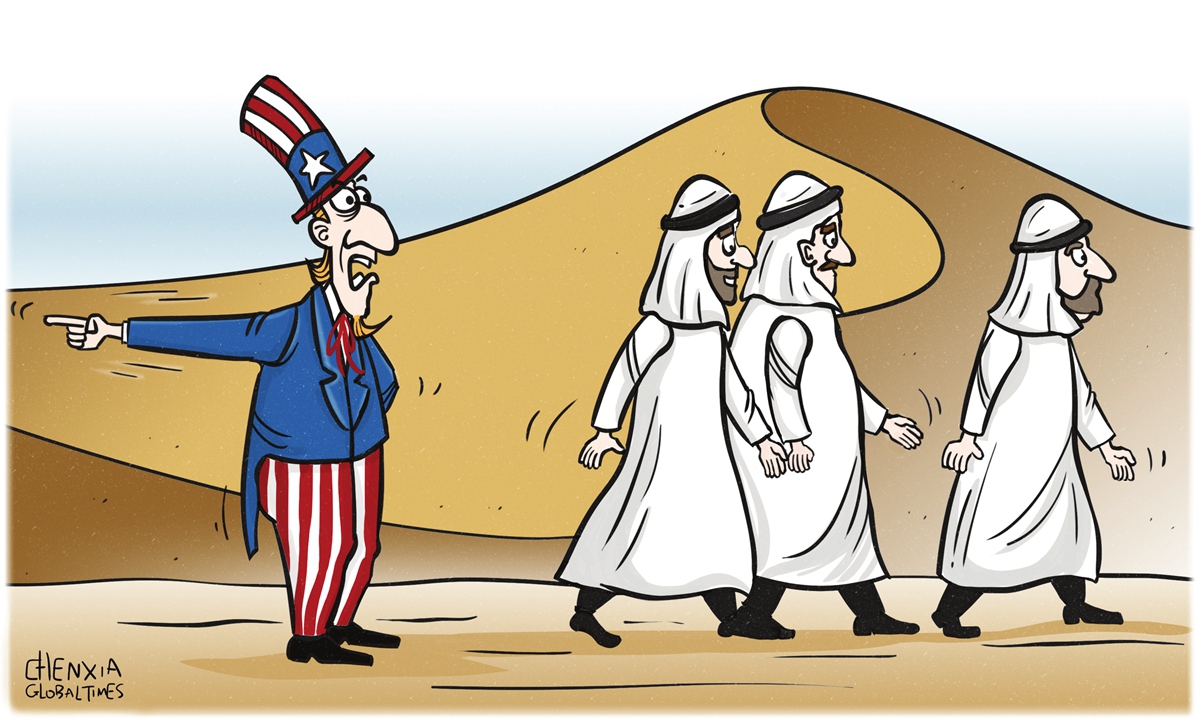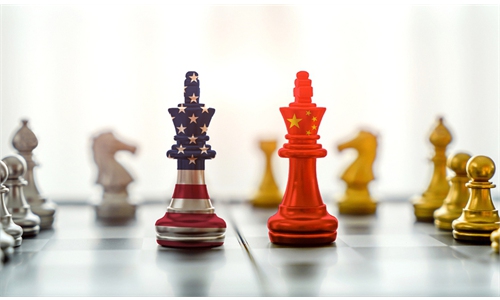US spy agencies interfering in China-Mideast AI cooperation; Washington's politicized act impedes region's development transition

US Arab Illustration: Chen Xia/GT
In a move to thwart China's technology cooperation with other countries, US media revealed that US authorities have warned Emirati artificial intelligence (AI) firm G42 over cooperation with China. A Chinese foreign ministry spokesperson on Tuesday said the US was engaging in "economic coercion" and undermining Chinese companies' cooperation with other countries for unfounded security reasons. The US' reckless crackdown on this cooperation not only impedes Middle Eastern countries' development transition process, it may also cloud the freshly resumed talks between China and the US on AI development, Chinese experts said.The New York Times reported on Monday that when National Security Advisor Sheikh Tahnoun bin Zayed Al Nahyan of the United Arab Emirates (UAE), visited the White House in June, his American counterpart, Jake Sullivan, raised the issue of G42, an AI firm that American officials believe is hiding the extent of its work with China.
The CIA and other American spy agencies have issued warnings about G42's work with large Chinese companies that US officials consider security threats, including Huawei, the telecommunications giant that is under US sanctions.
US officials fear G42 could be a conduit by which advanced American technology is siphoned to Chinese companies or the government. The US intelligence reports also warned that G42's dealings with Chinese firms could be a pipeline to get the genetic data of millions of Americans and others into the hands of the Chinese government, The New York Times cited two officials familiar with the reports as saying.
G42 did not respond to a request for comment from the Global Times as of press time.
In response, Wang Wenbin, a spokesperson of the Chinese Ministry of Foreign Affairs said on Tuesday that he is not aware of the specifics." I would like to stress that the US has sabotaged cooperation between Chinese companies and other countries on multiple occasions under hypothetical pretexts, which is economic coercion.
When asked by relevant countries to provide credible proof for the so-called "security threat", the US has been stammering around or giving ambiguous answers, he said.
"China always opposes the US overstretching the concept of national security, politicizing and weaponizing economic and trade issues or approaching them from an untenable security angle, and obstructing normal investment activities in the industrial community and private sectors. Such moves by the US undermine international economic order and trade rules and threaten the stability of global industrial and supply chains. Those attempts find little support and will not get anywhere," the spokesperson said.
Last week, US media Bloomberg cited sources as saying that Middle Eastern wealth funds are facing greater scrutiny on US deals from the Biden administration, part of a broader pushback on entities perceived to have close ties with Beijing.In recent months, US officials have expressed mounting concerns that critical technology, infrastructure and data that get to the UAE could potentially end up in the hands of Beijing, sources familiar with matter said. The scrutiny is particularly acute for Abu Dhabi because decisions on national security, foreign policy and international investments are made by the same few royals, the sources said, according to Bloomberg.
In recent years, China has engaged in deep cooperation with Middle Eastern countries in high-tech fields such as AI and communication, and there is great potential for further collaboration, Ding Long, a professor at the Middle East Studies Institute of Shanghai International Studies University, told the Global Times.
He pointed out that Middle Eastern countries are in a critical period of economic transformation, striving to reduce their reliance on natural resources and seeking to boost growth via technological innovation. China has advantages in high-tech fields and thus the cooperation on high-tech fields can be a win-win.
However, the US has been politicizing and using long-arm jurisdiction to interfere with China's technological cooperation with the Middle East, which will impede the region's development transition, Ding said.
The US' reckless crackdown on China's technological cooperation with the Middle Eastern countries comes as Beijing, Washington and other countries jointly signed a declaration on the development of AI in early November, in which they agreed to work together on AI safety research. Earlier this month, China and the US agreed to start government talks on AI development.
Chinese experts said if the US continues to talk about AI cooperation on the surface whilst attempting to block other countries from working with China, it will surely cloud the chances of increasing cooperation between China and the US if this attitude persists.

